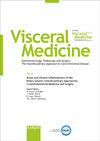Medical Therapy of Active Ulcerative Colitis
引用次数: 11
Abstract
Background: Medical therapy of mild and moderate ulcerative colitis (UC) of any extent is evidence-based and standardized by national and international guidelines. However, patients with steroid-refractory UC still represent a challenge. Methods: A literature search using PubMed (search terms: ulcerative colitis, therapy, new, 1-2008-2015) resulted in 821 publications. For the current article, 88 citations were extracted including 36 randomized controlled studies, 18 reviews, and 8 meta-analyses. Results: In steroid-refractory UC, early intensive therapy using anti-tumor necrosis factor (TNF) antibodies or the calcineurin inhibitors cyclosporine and tacrolimus is indicated in any case to prevent progression to a toxic megacolon and/or to avoid proctocolectomy. In patients with chronic disease activity, treatment with anti-TNF antibodies has a higher level of evidence than azathioprine therapy and should therefore be preferred. However, there is a subgroup of UC patients who may achieve prolonged steroid-free remission on azathioprine monotherapy. The importance of vedolizumab, a newly registered inhibiting antibody against integrin, has not yet been fully clarified since direct comparison studies are lacking, in particular in relation to anti-TNF antibodies. Conclusion: There is a great need for additional innovative therapies, especially in cases of primary non-response or secondary loss of response to anti-TNF antibodies. New small molecules (Janus kinase inhibitors) are promising with an acceptable safety profile and efficacy in UC. Further, strategies that target the intestinal microbiome are currently considered for patients with active or relapsing UC, and may in the future open up new therapeutic options.活动性溃疡性结肠炎的药物治疗
背景:任何程度的轻中度溃疡性结肠炎(UC)的药物治疗都是循证的,并被国家和国际指南标准化。然而,类固醇难治性UC患者仍然是一个挑战。方法:使用PubMed进行文献检索(检索词:溃疡性结肠炎,治疗,new, 1-2008-2015),共获得821篇文献。在这篇文章中,我们提取了88条引用,包括36项随机对照研究、18篇综述和8项荟萃分析。结果:在类固醇难治性UC中,在任何情况下,使用抗肿瘤坏死因子(TNF)抗体或钙调磷酸酶抑制剂环孢素和他克莫司进行早期强化治疗,以防止发展为毒性巨结肠和/或避免直结肠切除术。在慢性疾病活动性的患者中,抗tnf抗体治疗比硫唑嘌呤治疗有更高的证据,因此应优先考虑。然而,有一亚组UC患者可以通过硫唑嘌呤单药治疗获得长期无类固醇缓解。vedolizumab是一种新注册的抗整合素的抑制抗体,其重要性尚未完全阐明,因为缺乏直接的比较研究,特别是与抗tnf抗体相关的研究。结论:迫切需要更多的创新疗法,特别是在抗tnf抗体原发性无反应或继发性丧失反应的情况下。新的小分子(Janus激酶抑制剂)在UC中具有可接受的安全性和有效性。此外,目前正在考虑针对活动性或复发性UC患者的肠道微生物组的策略,并可能在未来开辟新的治疗选择。
本文章由计算机程序翻译,如有差异,请以英文原文为准。
求助全文
约1分钟内获得全文
求助全文

 求助内容:
求助内容: 应助结果提醒方式:
应助结果提醒方式:


